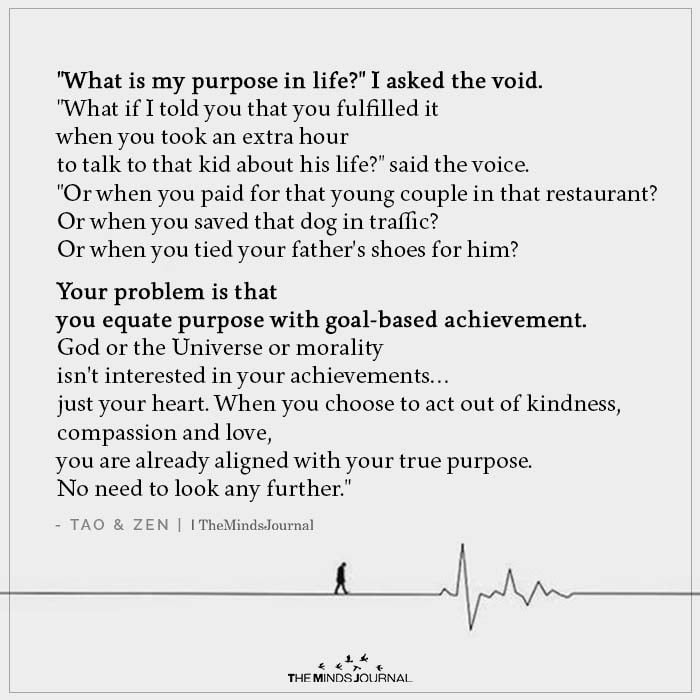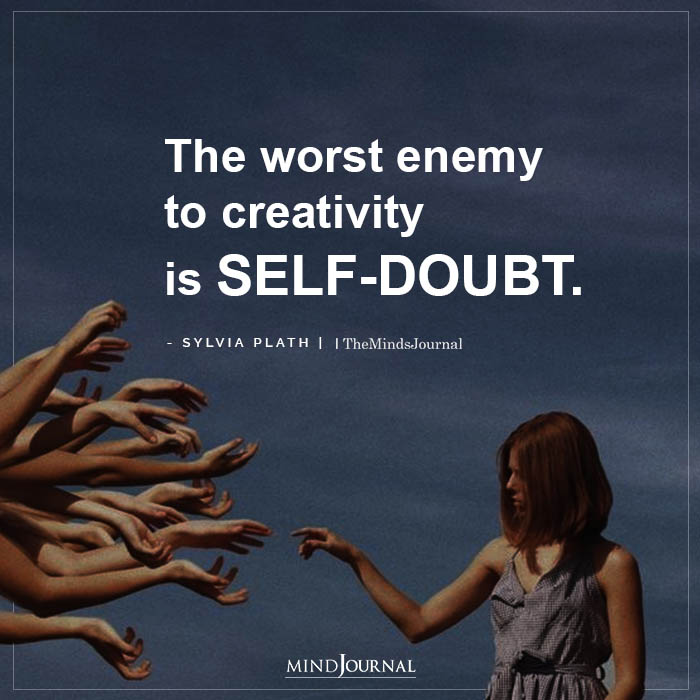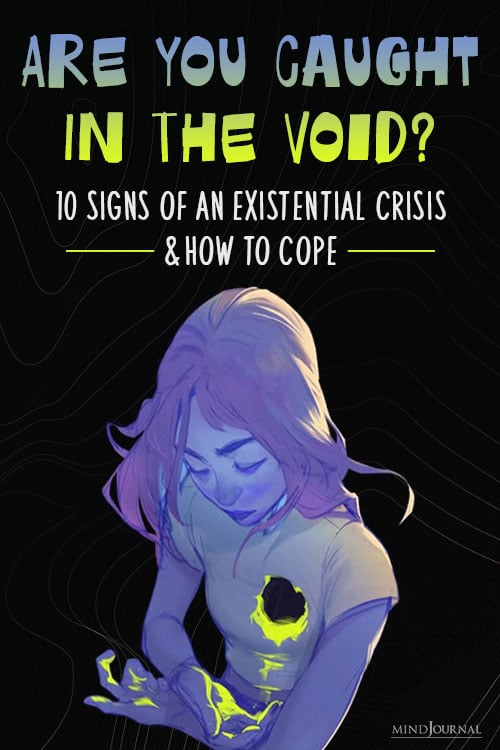Have you ever had a moment where life just doesn’t feel like it fits anymore? When the things that used to excite you now feel like empty rituals, and the world itself seems to have lost its color? Maybe you are going through an existential crisis.
It’s a sensation that creeps in quietly, yet hits you with a force that shakes the very core of your being. Everything you thought you knew about yourself, your purpose, and the world starts to unravel.
You begin to wonder, “What’s really going on here?” If this sounds all too familiar, you may be in the midst of a profound internal shift.
Let’s explore what is an existential crisis, it’s signs and the best ways when it comes to dealing with existential crisis.
Related: When Life Feels Empty: 7 Signs of an Existential Crisis and Ways to Cope
What Is An Existential Crisis?
An existential crisis is a period of deep questioning about life’s meaning, purpose, and your place in the world. It’s that overwhelming moment when you wonder: “Why am I here?” or “What’s the point of it all?”
You can experience this at any stage of life, and this might be triggered either by a major life event or a sense of constant discontentment.
Going through an existential crisis can be heavy on your mental and emotional health; it can shake you to your core, leaving you feeling lost and disconnected.
Knowing what is an existential crisis can help you take the first step towards dealing with one. Now that we know what an existential crisis is, let’s talk about some of the major existential crisis symptoms.
10 Signs Of An Existential Crisis
1. You feel an overwhelming sense of meaninglessness.
One of the most common existential crisis symptoms is feeling like everything is meaningless. Whether it’s your job, relationships, or hobbies, nothing seems to hold value anymore.
You might find yourself questioning the purpose of even the simplest tasks like getting out of bed or going to work. The world feels flat and empty, as if all the things that once gave you joy and happiness have lost their spark.
It’s a heavy feeling that can be difficult to shake off, and you may even question why you’re doing anything at all.
2. You constantly question your life’s purpose.
In an existential crisis, the question of life’s purpose dominates your thoughts. You start asking questions like: “Why am I here?”, “What is my role in the universe?”, or “Does anything truly matter?”.
These deep, probing thoughts can feel relentless, and no matter how much you think about it, you struggle to find satisfying answers.
It can feel like you’re searching for a hidden key to unlock the mysteries of your existence, but the more you look for it, the more confused and unsettled you feel.

3. You go through feelings of detachment.
Feeling detached from others and even from yourself is another hallmark of an existential crisis. You might notice that your emotions feel distant or that you’re simply going through the motions of life without really being present.
It’s almost as if you’re watching yourself from the outside, feeling disconnected from the things and people around you.
This sense of detachment can make all the relationships around you feel strained, as you find it harder to connect emotionally with your friends or loved ones.
4. You feel a sense of loneliness.
One of the major existential crisis symptoms is that it often brings with it an intense feeling of loneliness, even if you’re surrounded by people.
This loneliness comes from feeling misunderstood, like no one else can truly relate to the deep questions and emotions you’re experiencing.
You may feel like you’re on your own, grappling with the world and the meaning of existence, while others seem perfectly content with their lives. You feel like everyone has got it all figured out, except for you.
This sense of isolation can make the whole experience even more emotionally draining.
Related: Philosophy And Depression: Does Studying Philosophy Make You Depressed?
5. You never feel motivated.
When you’re in the midst of an existential crisis, motivation to do even the simplest tasks can disappear. Things that once excited you or kept you going now feel pointless or empty.
You might start neglecting work, social activities, or personal projects because they no longer seem to have a purpose.
This loss of motivation often stems from the bigger question of “Why bother?” when you’re not even sure what life is all about anymore.
6. You have a fear of death or the unknown.
For many people, an existential crisis brings up intense fears about death or what happens after we die. These thoughts can spiral into anxiety as you start contemplating your own life in this world and the uncertainty of the afterlife.
You might obsess over what happens when you die, or feel paralyzed by the realization that life is finite.
These existential fears are often at the root of the crisis, making you deeply uncomfortable with the idea that one day, your life is going to end and everything else is also going to come to an end.
7. You experience existential anxiety.
One of the subtle existential crisis examples is this. This kind of crisis can also trigger existential anxiety—a deep, overwhelming worry about the bigger questions of life.
It’s not just everyday stress; it’s a persistent feeling of dread or unease tied to the uncertainty of existence.
You may experience panic attacks, racing thoughts, or a general sense of being overwhelmed by the intensity and magnitude of these questions. This anxiety can take over your thoughts and make it hard for you to focus on anything else.
8. You feel a desire for deep change.
What is an existential crisis? An existential crisis often sparks a desire for profound personal or spiritual change. You may feel that your current way of living is no longer sustainable and that you need to make significant adjustments to find fulfillment.
Whether it’s changing careers, relationships, or your entire outlook on life, this craving for change can be a powerful sign that you’re in the midst of a deep existential shift.
It’s the sense that something big needs to happen for you to feel aligned with your purpose.
Related: Dark Night Of The Soul: 7 Symptoms That Forecast Your Spiritual Purging
9. You feel a deep desire for being your most authentic self.
Another one of the major existential crisis examples is a profound craving for authenticity in everything you do. You may no longer have patience for superficial relationships or activities that don’t align with your true self.
This can show up as you longing for more meaningful conversations, deeper connections, or a search for work that fulfills your purpose.
The surface-level aspects of life—small talk, social media, or materialism—suddenly feel unbearable and disgusting, as you yearn for something real and fulfilling.
10. You exhibit increased sensitivity to the world around you.
During an existential crisis, you may notice a heightened sensitivity to the world around you. Sounds, sights, and even the emotions of others can seem overwhelming or deeply affecting.
You might start to feel more connected to nature or the struggles of humanity, but in a way that feels heavy or burdensome.
This newfound sensitivity often leads to more questions about life’s meaning, as you grapple with how much you feel and perceive compared to before.
Now that we know all the major existential crisis symptoms, let’s talk about dealing with an existential crisis.
7 Best Strategies For Dealing With An Existential Crisis
1. Practice mindfulness.
Mindfulness is a powerful tool for grounding yourself in the present moment. During an existential crisis, your mind often gets lost in abstract thoughts about the future, the past, or the meaning of life.
Practicing mindfulness through meditation, deep breathing, or simply being aware of your surroundings helps bring your attention back to the here and now.
It allows you to reconnect with the present, reducing feelings of anxiety and giving you a sense of control.
2. Embrace uncertainty
Accepting that some questions may not have clear answers can be freeing. Life is full of mysteries, and part of the human experience is learning to live with that uncertainty.
When it comes to dealing with existential an crisis, instead of trying to force answers or feeling frustrated by not having them, try to embrace the unknown.
By doing so, you open yourself up to the beauty and possibilities that come with uncertainty, rather than fearing it.
3. Seek meaning in small things
When life feels meaningless, start by finding purpose in the little things. Whether it’s the satisfaction of completing a task, the joy of spending time with loved ones, or simply enjoying a cup of coffee, focusing on small pleasures can remind you that life is made up of these moments.
You don’t have to have everything figured out to enjoy life—sometimes, it’s the simple joys that carry the most meaning.
Related: What is Existential Depression? 15 Signs You Have It
4. Spend some time in nature.
Nature has a calming, healing quality that can help you reconnect with yourself and the world around you. Taking walks, hiking, or simply sitting in a park can provide a sense of perspective and peace.
In nature, you’re reminded that life moves in cycles, and that change and uncertainty are natural. This can help ease existential anxiety and offer a sense of connection to something bigger than yourself.
5. Feed your creative spirit.
When it comes to dealing with an existential crisis, creativity allows you to explore your thoughts and emotions in a non-verbal way, which can be incredibly therapeutic.
Whether it’s through writing, painting, music, or dance, creative expression helps you process complex emotions and can lead to you having a better understanding about yourself and your place in the world.
It’s a way to release the heavy feelings you’re experiencing and turn them into something meaningful and something you can be proud of.

6. Confide in someone you trust.
Talking to a close friend, therapist, or spiritual advisor can help you feel less alone in your crisis.
Expressing your thoughts and fears out loud often makes them feel less overwhelming, and having someone listen without judgment can offer a lot of comfort and peace.
Sometimes, just knowing that someone out there understands you or has gone through a similar experience can make a huge difference in how you feel.
7. Try to connect with your spiritual side.
For many, an existential crisis is deeply tied to spiritual questions. Exploring spirituality—whether through religion, meditation, or some good old philosophical inquiry—can provide a sense of direction or comfort.
This doesn’t mean you have to adopt a specific belief system, but engaging with spiritual ideas can help you tremendously in better understanding your place in the universe.
It may not provide all the answers, but it can help you feel more connected to something larger than yourself.
Related: Overwhelmed By Setbacks? 5 Effective Ways To Combat Crisis Fatigue And Recharge Your Spirit
Takeaway
An existential crisis is a profound experience, but it can also serve as a great opportunity for spiritual and mental growth.
When you understand it’s signs and know how to deal with it in the right way, you can navigate through the uncertainty and emerge with a deeper sense of meaning and purpose.










Leave a Reply